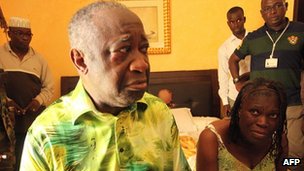Ab-Titchaz
JF-Expert Member
- Jan 30, 2008
- 14,631
- 4,225
Ivory Coast's Laurent Gbagbo arrives in The Hague


A convoy of vehicles said to have taken Laurent Gbagbo to Korhogo airport

Former Ivory Coast President Laurent Gbagbo has arrived at the International Criminal Court (ICC) at The Hague.
He left the northern town of Korhogo, after an arrest warrant was issued, and was flown to Rotterdam, from where he was transferred to detention in The Hague early on Wednesday.
The ICC has been investigating alleged war crimes committed in unrest after last year's disputed elections.
The transfer comes just two weeks before legislative elections.
Laurent Gbagbo had been under house arrest in Korhogo since April when he was ousted.
The BBC's John James in the Ivorian commercial capital Abidjan says there have been continual reports in the local press that armed supporters of the former president would attempt a jail break.
Forces loyal to him and those of his rival, President Alassane Ouattara, stand accused of killings, rapes and other alleged abuses in the conflict.
'Victor's justice'
ICC chief prosecutor Luis Moreno Ocampo visited the country in mid-October to investigate the post-election violence.
He said his investigation would be impartial, and that he would focus on up to six people who he said were most to blame for the violence.
He left the northern town of Korhogo, after an arrest warrant was issued, and was flown to Rotterdam, from where he was transferred to detention in The Hague early on Wednesday.
The ICC has been investigating alleged war crimes committed in unrest after last year's disputed elections.
The transfer comes just two weeks before legislative elections.
Laurent Gbagbo had been under house arrest in Korhogo since April when he was ousted.
The BBC's John James in the Ivorian commercial capital Abidjan says there have been continual reports in the local press that armed supporters of the former president would attempt a jail break.
Forces loyal to him and those of his rival, President Alassane Ouattara, stand accused of killings, rapes and other alleged abuses in the conflict.
'Victor's justice'
ICC chief prosecutor Luis Moreno Ocampo visited the country in mid-October to investigate the post-election violence.
He said his investigation would be impartial, and that he would focus on up to six people who he said were most to blame for the violence.

A convoy of vehicles said to have taken Laurent Gbagbo to Korhogo airport
A statement read on Ivorian national television signed by the state prosecutor, Simplice Kouadio, said the ICC had issued an arrest warrant for Mr Gbagbo last week, which he had received this Tuesday in the presence of his lawyers.
Human rights groups welcomed the arrest warrant, but also cautioned against "victor's justice".
"While the Gbagbo camp fuelled the violence, forces on both sides have been repeatedly implicated in grave crimes," said Elise Keppler of Human Rights Watch.
"Victims of abuse meted out by forces loyal to President Ouattara [also] deserve to see justice done," she said.
In a statement to Reuters, an adviser to Mr Gbagbo, Toussaint Alain, branded the former president's transfer "victor's justice".
Although the Ivory Coast is not one of the member countries covered by the ICC, it has accepted its jurisdiction.
Mr Gbagbo is also being investigated by Ivorian justice officials for "economic crimes". He has been charged with looting, armed robbery and embezzlement.
Laurent Gbagbo was the president of Ivory Coast for 10 years, during which time the country was virtually partitioned by civil war.
But it is the period since the presidential elections a year ago that the prosecutors of the ICC have been investigating.
Mr Gbagbo refused to give up power when his rival Alassane Ouattara was internationally recognised as the winner of last November's presidential vote.
It is not clear what charges Mr Gbagbo will face at the ICC, but around 3,000 people died in the post-election violence provoked by Mr Gbagbo's decision to cling to power.
The BBC's World Affairs correspondent Peter Biles says Mr Gbagbo's transfer to The Hague will be welcomed by some, but it could also re-open the wounds in a country still traumatised by conflict.
BBC News - Ivory Coast's Laurent Gbagbo arrives in The Hague
